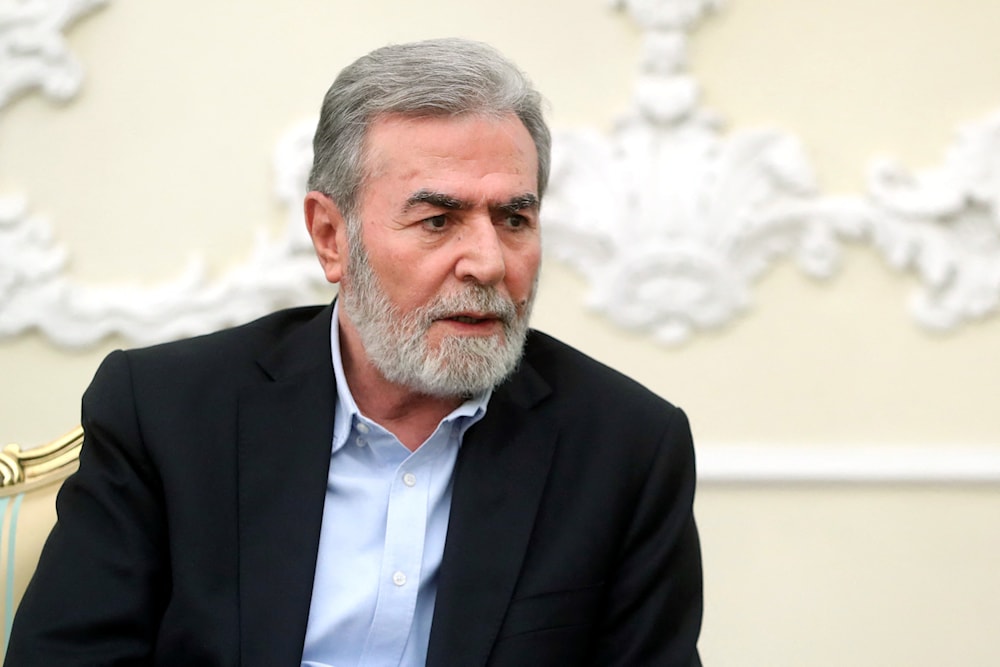Gaza's reconstruction and more... What are PIJ's goals in Egypt talks?
The Palestinian Islamic Jihad's Secretary-General, Ziyad al-Nakhalah, says the Resistance will engage in talks in Egypt under a clear vision.
-

The secretary-general of the Palestinian Islamic Jihad Movement, Ziyad al-Nakhalah, during a meeting with the Iranian President Ebrahim Raisi in Tehran, August 4, 2022 (Iranian Presidency Office)
The Secretary-General of the Palestinian Islamic Jihad Movement affirmed on Wednesday that the Resistance movement will be engaging in the negotiations held in Egypt with a clear set of goals: the end of the Israeli aggression on Gaza, the withdrawal of Israeli forces and the reconstruction of the devastated Strip.
In a press release, al-Nakhalah said that the prisoner exchange will only take place through the principle of all-for-all swap within a political process agreed upon by the Palestinian people, represented by their political entities, foremost among them the Islamic Resistance Movement, Hamas.
Al-Nakhalah had revealed earlier that the movement holds more than 30 Israeli captives.
Earlier today, Hamas' Political Bureau chief Ismail Haniyeh landed in Cairo for talks with Egyptian officials regarding the Israeli war on Gaza and "other issues," as per the Resistance group.
The Resistance group has repeatedly stressed that there will be no talks of any prisoner swap deal until the aggression on Gaza ends.
Sources told AFP that Haniyeh, who is heading a senior Hamas delegation, is scheduled to meet Egypt's intelligence chief Abbas Kamel and other officials for talks on “stopping the aggression and the war to prepare an agreement for the release of prisoners."
Discussions will mainly revolve around “the delivery of humanitarian aid, the withdrawal of the Israeli army from the Gaza Strip and the return of displaced persons to their towns and villages in the north,” the sources added.
'Israel' submits to the Resistance's conditions
This comes at a time when Israeli media outlets reported that the occupation entity informed Qatar of its readiness to negotiate a one-week ceasefire in Gaza for the release of 40 captives in exchange for an unspecified number of Palestinian prisoners.
The new position represents a shift from previous stances, where Israeli Prime Minister Benjamin Netanyahu and his Security Minister Yoav Gallant considered that any truce would mean less pressure on the Resistance in Gaza, which in turn would mean weakening the entity's negotiating position.
However, this was not the first shift, as both top officials previously declared that they would "liberate" all captives through military means in the invasion.
This change in strategy marks a new achievement for the Resistance, who repeatedly affirmed that no captives would be released unless through a prisoner exchange.
During the 7-day temporary truce, which ended on December 1, the Resistance liberated 240 Palestinian prisoners, mainly women and young girls and boys, in exchange for the release of 81 Israeli captives.
On the other hand, upwards of 60 Israeli captives have been killed since the Israeli aggression on the Gaza Strip commenced, some by airstrikes while others were killed by the gunfire of Israeli special forces.
Read more: Three Israeli captives killed by IOF were holding white flags

 3 Min Read
3 Min Read








